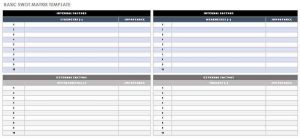— January 30, 2018

FotografieLink / Pixabay
Not too long ago I wrote a piece on 5 life skills every professional should know. These are the basics that you won’t learn about in college or university but should have in your arsenal of skills to succeed in your professional career. Similar to these are a few other basic skills that you’ll acquire if you went to business school, however, they’ll elude you if you didn’t.
Now I’m not suggesting that without these skills you won’t be able to do your job. As a subject matter expert and master of your domain I’m confident you’re able to perform your duties with excellence. However, if you were to add on to your knowledge bank these basic skills you’ll be able to propel your careers, irrespective of your chosen path.
These skills are the fundamentals of any career you choose. Whether you’re a medical practitioner, engineer, project manager or even an app developer, with these basic skills you’ll have a better understanding and appreciation of how things work and the impact of your actions on the company. You’ll also likely be able to enhance your contributions.
1. Accounting & Finance
Let’s admit it – no one likes dealing with finances and accounting. Well, not unless you’ve made a career of it, which is perfectly fine. However, everyone else tries to avoid it at all costs. People tend to find money matters dull, boring and often cumbersome. Sure, it may appear like it on the surface, however, there’s very little you can do to get around it.
Financials and accounting are a pivotal part of running a business. If you’re an employee at a company you’ll hear about many discussions around profitability, ROI and other such financial terms. If you’re working for yourself, even if you have a genius idea or a unique service to offer, you’ll be forced to think about profitability and costing and all that. All of these financial terms are important and highly unavoidable. Sure you could seek professional help, however, that too can lead to mysterious happenings in your accounting books. You need to be aware of all these. Being in command of financials will allow you to know what’s going on in the company and how you can better steer your entrepreneurship endeavors.
2. Marketing
When you think about marketing you probably associate Sales with it. Sure marketing may go hand in hand with sales and help promote your brand to increase sales, however, it’s much more than that. Also, you may be wondering why a Doctor who has their own practice needs marketing skills? Or how an engineer in a company can apply marketing skills?
Well, by definition marketing is the action of promoting. It entails market research, advertising and pricing strategies all to produce the right promotion to make your products and services attractive. So then if you have you your own practice how do you plan to attract customers if you aren’t able to promote your services? Advertising. How do you retain these customers to keep coming back to you and not leaving you for your competitors? Market research. Are you certain that you’re charging your customers the right price that covers your costs and ensures your margins are sustainable to your practice? Pricing Strategy.
All this doesn’t simply apply to those who have their own practice or business. If you’re an engineer or developer at a company with marketing skills you’ll be able to help promote your company’s brand. Why that’s important is because while you’re employed with the company, the brand’s image, through association, reflects on you and your career. Enhancing and promoting your company’s brand will then in turn promote you and your career.
3. Project Management
If you’re a person who strives to succeed then you obviously have a goal that you’re aiming for. To get to that goal, however, you’re aware that there are certain milestones for you achieve. These are the incremental steps you’ll be taking to get to your goal. And you’re also aware that these milestones cannot be achieved overnight or in a day. You’ll need to pace yourself, work on each of them and check them off as you accomplish them one at a time. Hence, your milestones require a timeline to follow. Along the way you’ll also realize that time isn’t the only variable that’ll facilitate your ability to achieve your milestones. There are people as well who you may need to rely on. Hence you’ll need to reach out to them for support to reach your goal.
You see what’s happening here? Every professional out there has goals, irrespective of what profession they’re in. Be it personal or professional goals, you’re bound to have them. With a skill like project management you’ll be able to ensure you’re on-track and gunning for each and every goal you ever set for yourself to its completion. You’ll stop procrastinating and feel more productive. And I can keep going on and on about the benefits of project management in your life, but I’m sure you get the drift. Project management is an essential skill that everyone should have much like time management.
4. Articulating Your Thoughts
Now here’s an interesting skill which isn’t something that you really can learn or really be taught. However, it’s about being self-aware, lots of practice and maybe even some guidance from a mentor. And while we all wish we could read a book and know precisely how to articulate our thoughts, it’s not possible or that easy. Yet, I find it to be highly useful and an essential part of the basic skills every professional should have.
Why is it important to articulate your thoughts? Imagine you’re an app developer trying to explain the intricacies of coding to a non-developer and why the changes they’re looking for in the app isn’t possible. You could throw all the technical jargon at them and it won’t make any sense. The problem really isn’t the language. It’s the difference between what you imagine and what the person you’re speaking to is understanding. There’s often a disconnect. This is where articulating your thoughts comes in handy. With this skill you’ll be better equipped to convey your message in a way that almost always guarantees the listener will understand it.
You could apply the same in various other situations. Ever sat in a meeting where you shared your opinion on a topic being discussed to a group of blank-faced individuals? Yes, I’m confident you’ll do marvelously well with an enhanced skill in articulating your thoughts.
Can you think of any other basic skills that every professional should possess? Leave a comment below so we all can learn from them.
Business & Finance Articles on Business 2 Community
(16)








